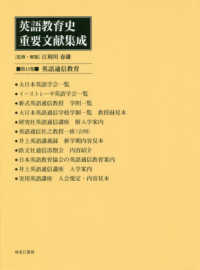- ホーム
- > 洋書
- > 英文書
- > Politics / International Relations
基本説明
Based on worldwide public opinion databases that surveyed anti-American sentiment in Islamic countries, Europe, Latin America, Africa, and East Asia.
Full Description
News stories remind us almost daily that anti-American opinion is rampant in every corner of the globe. Journalists, scholars, and politicians alike reinforce the perception that anti-Americanism is an entrenched sentiment in many foreign countries. Political scientist Giacomo Chiozza challenges this conventional wisdom, arguing that foreign public opinion about the U.S. is much more diverse and nuanced than is generally believed. Chiozza examines the character, source, and persistence of foreign attitudes toward the United States. His findings are based on worldwide public opinion databases that surveyed anti-American sentiment in Islamic countries, Europe, Latin America, Africa, and East Asia. Data compiled from responses in a wide range of categories-including politics, wealth, science and technology, popular culture, and education-indicate that anti-American sentiments vary widely across these geographic regions. Through careful analyses, Chiozza shows how foreign publics balance the political, social, and cultural dimensions of the U.S. in their own perceptions of the country.
He finds that popular anti-Americanism is mostly benign and shallow; deep-seated ideological opposition to the U.S. is usually held among a minority of groups. More often, Chiozza explains, foreigners have conflicting attitudes toward the U.S. He finds that while anti-Americanism certainly exists, the United States is equally praised as a symbol of democracy and freedom, its ideals of liberty, equality, and opportunity applauded. Chiozza clearly demonstrates that what is reported as undisputed fact-that various groups abhor American values-is in reality a complex story.
Contents
List of Tables
List of Figures
Acknowledgments
Part I: Themes and Theory
1. Overview
Introduction
The Central Argument
Attitudes towards the United States
A Historical Overview
Roadmap of This Book
2. Two Theories on Anti-Americanism
Introduction
Measuring Anti-Americanism
The Popular Basis of Anti-American Sentiment
Two Views on Anti-Americanism
The Soft Power Thesis
Conclusions
Part II: Features
3. Patterns of Anti-Americanism
Introduction
Dimensions of Anti-Americanism
The Multifaceted Opinions about the United States
Are People Just Trying to Be Polite?
Conclusions
4. Testing the Soft Power Thesis
Introduction
Description of the Data
Finding the Patterns of Anti-Americanism
Policy, Polity, and Soft Power
Conclusions
Part III: Sources
5. Profiles of Anti-American Opinion
Introduction
Profiles of Respondents
Four Hypotheses
The Empirical Tests
The Findings
Conclusions
6. The Sources of the Policy and Polity Frames
Introduction
Individual-level Determinants of Anti-Americanism
Country-level Determinants of Anti-Americanism
Findings on Respondents' Identities
Findings on Country Factors
Conclusions
Part IV: Persistence
7. Anti-Americanism beyond 2002
Introduction
The Image of America in Times of Crisis
Assessing the Persistence of Anti-Americanism
Five Mechanisms
Conclusions
8. An Evaluations of the Persistence of Anti-Americanism
Introduction
Empirical Findings
Will Anti-Americanism Persist?
Conclusions
9. Conclusions
Notes
References
Index






